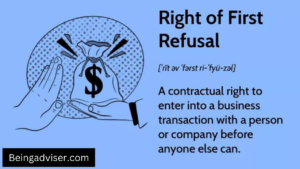What Is a Right Of First Refusal?( ROFR)
A contractual right to engage in a business transaction with an individual or organization before anybody else is able to is called the right of first refusal (ROFR), sometimes referred to as the first right of refusal. The obligor is free to consider other offers if the party with this right declines to engage in a transaction. Real estate tenants like this clause because it allows them to have preference over the properties they rent. But it might restrict the amount that the owner could get from buyers vying for the property.

How a Right Of First Refusal Works( ROFR )
Similar to options contracts, rights of first refusal clauses grant the holder the option—but not the obligation—to engage in a transaction that typically involves the sale of an asset. This right gives the holder the first opportunity to create a contract or agreement on an asset before anybody else does.
People or businesses who wish to see how a business or opportunity turns out typically request rights of first refusal. A right of first refusal gives the right holder the option to participate later rather than immediately incurring costs and obligations.
It is possible to modify right of first refusal clauses to produce unique versions of the standard agreement. As a result, the parties may include modifications, like defining the duration of the right or authorizing a third party that the buyer designates to complete the transaction. Right of first refusal contracts are usually temporally bound. The seller is free to look for other buyers after the time period ends.
KEY TAKEAWAYS
- A contractual right that allows its holder to conduct business with the other contracting party before others can is known as a right of first refusal.
- When other parties show interest in an asset, the ROFR guarantees the holder that they won’t forfeit their rights.
Due to the restriction on negotiating offers from third parties before the rights holder, the right of first refusal may limit the potential profits of the owner.
Advantages and Disadvantages of Rights of First Refusal( ROFR)
A right of first refusal ensures that the entitled party will not lose their rights to an asset that they desire or require; it functions as a kind of insurance policy. For instance, a business tenant might prefer to rent a space; nonetheless, if purchasing the property meant he would have to leave if the property sold to a new owner, he might do so. In that scenario, the tenant would work to include a clause granting him the right of first refusal in his lease. This would give him the opportunity to purchase the property before others do, should leasing become unfeasible.
On the other hand, the right of first refusal hinders the property owner because it makes it harder to bargain with multiple buyers, who might raise the price in a bidding war. If the landlord in the aforementioned example knows that the current tenant is always first in line to buy, they might find it difficult to attract other buyers. The property owner may still exercise the right of first refusal, though, if doing so is necessary to draw in the ideal tenant.
Special Considerations
Rights of first refusal are frequently observed in joint venture scenarios in the business world. When one partner leaves a joint venture, the remaining partners typically have the option to buy out their stakes first. Similar to this, a ROFO allows non-selling shareholders to buy selling shareholders’ shares before they are made available to the general public through a shareholder agreement.
In numerous other domains, such as real estate, sports, and entertainment, first refusal rights are a typical occurrence. A publishing house might request the first dibs on upcoming books written by a new author, for instance.
Right of first refusal in real estate
The right of first refusal in real estate refers to a contractual provision that grants priority to an interested party to make the first offer on a property before the seller engages in negotiations with other potential buyers.
Usually, the interested buyer and the property owner sign a right of first refusal agreement, which may include a possible sale price. If the owner receives competitive offers, which the owner must share with the interested buyer, the sale price may also be negotiated afterwards.
The owner may request that the prioritized buyer match or renegotiate in the event that an outside offer exceeds the amount specified in the ROFR clause. With the right of first refusal, the interested buyer has two options: accept the revised price and move forward with the sale, or decline the offer, in which case the owner will have to engage in further negotiations with other buyers.
A timeline for what happens after the owner decides to sell the property may be included in the right of first refusal clause. This timeline could include things like how quickly the prioritized party must agree to buy or how quickly they must respond to price negotiations.
When a right of first refusal might be used
Renters who may wish to purchase their current rental property at the end of their lease often request the right of first refusal. They can submit an offer for the property through ROFR before the landlord takes on unsolicited bids. In the unlikely (or not so unlikely) event that they decide to sell the property, landlords may give their tenants the option.
The right of first refusal can be utilized in estate planning to assist family members in preventing future disputes over inheritances. It’s advisable that they get legal and real estate counsel.
In other situations, a homeowner may be approached by a real estate agent who asks if they would be open to working with a potential buyer when and if they decide to sell their property.
How to get a right of first refusal
Lawyers are usually involved in the drafting of a right of first refusal clause because of the legal aspects of the agreement. It’s likely that one attorney will be defending the owner and another representing the potential buyer. As previously mentioned, a right of first refusal clause usually predetermines the selling price; therefore, both lawyers will spend time on this detail to guarantee a reasonable starting point for the buyer and a reasonable, possibly fixed, selling price for the owner.
Right of first refusal vs. right of first offer(rofr vs rofo)
In that they both grant priority to the party with the highest priority, a right of first offer (ROFO) and a right of first refusal are comparable. However, the seller does not have to bargain with the primary party when they have a right of first offer. The interested party must be informed by the owner that the property is for sale and given the opportunity to submit the initial offer. The owner is then free to negotiate with third parties if they choose to reject the offer or accept it.
FAQs
What is an example of a ROFR?
A real estate owner could, for example, give a potential buyer the opportunity to purchase his property at a particular price before making it available to other buyers thanks to the Right of First Refusal clause.
What is the difference between a ROFR and a ROFN?(rofo vs rofr)
A ROFR is a very powerful option to have in M&A scenarios because, unlike a right of first offer (ROFO) or right of first negotiation (ROFN), it requires a seller to actually offer the exact deal requested by an interested third party buyer to the holder of the ROFR.
What is a ROFR and Cosale agreement?
What is a Co-Sale and Right of First Refusal Agreement? The company and investors have the right to purchase or sell shares before a shareholder can sell them to a third party, thanks to the Right of First Refusal, or ROFR, and the Co-Sale Agreement.
What is the mechanism of ROFR?
Put simply, a ROFR gives the non-selling shareholders the option to accept or reject an offer from a selling shareholder following the selling shareholder’s receipt of an offer for its shares from a third party.
What is the ROFR price?
A ROFR clause mandates that the ROFR holder “match” the purchase price that a third party offers at a rate of 105 percent. (In certain cases, this is at least partially justified by stating that the owner requires the cushion to pay any break-up costs it must pay to the third-party offeror.
Conclusion:
In real estate, a right of first refusal clause grants a prospective buyer the first chance to buy a piece of land. Renters wishing to purchase from their landlords and families preparing for estate inheritances are two common situations where it occurs. Drafting contracts with first refusal rights and estimating a possible purchase price are common tasks for lawyers. Although they both grant a party priority, rights of first refusal and first offer have different deadlines and requirements for negotiations.
FOR MORE INFORMATION VISIT OUR HOMEPAGE:



